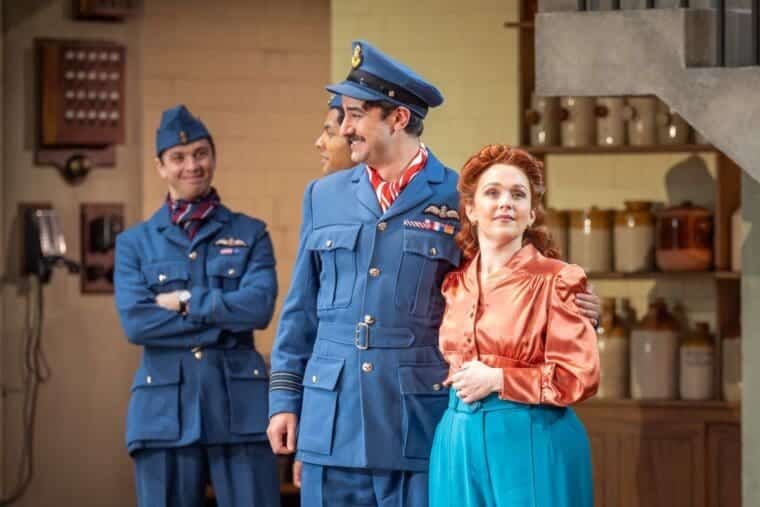At ENO, are there crumpets still for tea?
OperaAlastain Macaulay reviews Donizetti’s time-shifted Elixir of Love at English National Opera:
Harry Fehr’s English National Opera adorable production of Donizetti’s “The Elixir of Love” (“L’Elisir d’Amore”, 1832) doesn’t just translate this idyllic rural comedy into the English language. It goes further, setting but into a classic English comic setting where Englishness itself is part of the fun.
We’re in the Home Counties during the Second World War. Adina is chatelaine of an English country house in a period when women are joining men in working the land; Dulcamara is an American black marketeer; Belcore and his colleagues are from the Air Force; Union Jack bunting lines the windows. Lord Emsworth’s Blandings Castle meets Dad’s Army meets Ealing Comedy. Set designer Nicky Shaw sets Act One in the house’s huge basement kitchen; Act Two in the ground-floor drawing-room, with five vast sash windows open onto vast sloping lawns.
Teresa Riveiro Böhm, a young conductor new to me, directs the score so infectiously – so dancily- that it’s hard to keep still in your seat as you listen: although this is an opera I’ve known almost fifty years, I testify that the brio and phrasing on Friday’s opening night made both my insteps and my spine respond kinaesthetically. (The only ingredient that is beneath the standards of ENO’s golden days is the quality of diction: our eyes keep seeking out the English surtitles, even though it shouldn’t be too hard for singers to lodge the words of Amanda Holden’s enjoyably clever translation in our ears.)
Böhm and Fehr have international experience; both are young people making their debut at English National Opera. All the cast is good or better than good. The New Zealand tenor Thomas Atkins, another first-rate ENO debutant, is not a bumpkin Nemorino; he’s long-limbed but bashful and unsophisticated, gawky in his V-neck sweater. But his singing is neither gawky nor unsophisticated: he has a bel canto command of cantilena vocal line with a wonderful ability to diminish sustained notes with no loss of quality, never for show but always to indicate feeling.
Rhian Lois very precisely and vividly captures the hearty character and challenged social status of Adina as a hearty English farming landowner who has charm that she knows how to use: wit, too. Nemorino’s desperate sincerity gradually wipes the cheerfulness from her. (The deep-red dress of her final appearance is perfectly designed by Zahra Mansouri: you can tell both that it’s her smartest frock but also that it’s been home-made.) Hers is a small voice; she uses it exquisitely. Both musically and physically, she and Atkins suspend time in their interchanges.
The American bass-baritone Brandon Cedei, yet another new to ENO, plays Dulcamara with very plausible bluff charm. Fehr’s production gives him two silent assistants – Reece Causton and Bridget Lappin – who are often hilarious in the acts they put on to help sell his dodgy wares. Belcore is well played and sung by Irish-British baritone Dan D’Souza. He, too, has a marvellously funny pair of sidekicks: the military keep-fit exercises they teach poor Nemorino gave me guffaws.
Everyone in the chorus is an individual character: we can place them as housemaids or members of the W.I. or workers contributing to what used to be called the land effort. This stage world blissfully bridges social realism with huggable caricature. And this whole production is a large slice of bliss. English National Opera has come perilously close to closure in recent years: productions like this should be the building bricks with which it is reassembled and restored to a place of national pride.
Alastair Macaulay






Comments